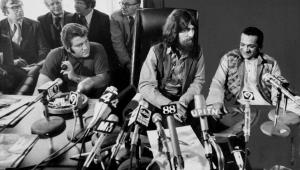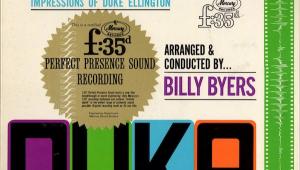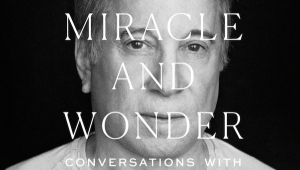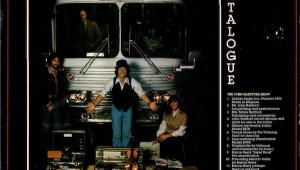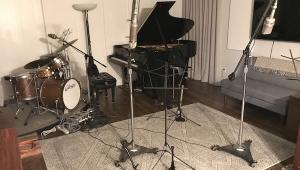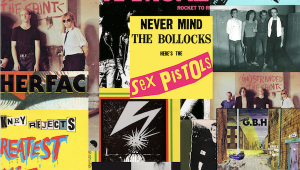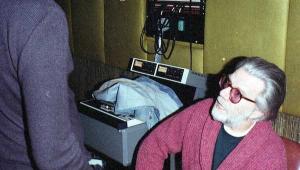A Burt Bacharach Interview from 1986 Still Fascinates
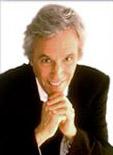
Years before Burt Bacarach became "hip" once again, well before he had a part in an Austin Powers movie, or wrote songs with Elvis Costello and Ronald Isley, your editor interviewed him. Bacharach's insight into music writing, recording and performing are still fascinating.—MF
In 1970, Simon and Schuster published a book called " How to do Almost Everything" written by syndicated columnist Bert Bacharach. The title refers to a collection of helpful home hints, not son Burt's musical career, but it might as well have.
Burt Bacharach has done just about everything in music. He's a composer, an orchestrator a producer and a concert performer. He's written for the stage ("Promises, Promises") and the screen ( "What's New Pussycat," "Butch Cassidy & The Sundance Kid," "Arthur," "After the Fox," and of course "Casino Royale," among others). And of course he's written for the pop charts where, with Dionne Warwick alone, he charted an amazing 39 times in ten years.
Gene Pitney, Marty Robbins, Herb Alpert, Sergio Mendes, Dusty Springfield, Tom Jones, Jackie DeShannon and many other performers have also scored hits with songs penned by Bacharach and his former partner, lyricist Hal David.
Bacharach did much more than merely write pop in the sixties, he defined it. In fact, it was his absolute dominance of the genre then, that mistakenly leads the casual observer today, into thinking that his output has since tapered off.
The first Gold Record of 1986 was "That's What Friends Are For" written by Bacharach, with his second wife, lyricist Carole Bayer Sager, and performed by Dionne Warwick, with Stevie Wonder, Elton John, and Gladys Knight. Proceeds from the song were donated to the American Foundation for AIDS Research.
Bacharach's second chart topping Gold Record of 1986 was "On My Own", recorded by Patti LaBelle and Michael McDonald. 1986 also saw chart singles by El DeBarge ("Love Always") and Kenny Rogers ("They Don't Make Them Like They Used To-- the theme from Tough Guys").
A week after HP (former The Absolute Sound editor and publisher Harry Pearson) asked me to track Burt Bacharach down and ask for an interview, I found myself at a restaurant, seated at the next table from the Bacharach family, who were there celebrating Burt's daughter's birthday. Fortunately I had the good taste not to bother him then.
When we finally did make contact, Burt graciously consented to this interview. Unfortunately, by the time he could take the time out to speak with me, I had moved back to the East Coast. Thus the interview had to be conducted by phone.
-M.F.
MF: You've been married, once literally (Carol Bayer Sager), once figuratively (Hal David ) to two extremely gifted lyricists. What effect does a lyricist have on a composer, and vice-versa?
BB: It's of vital importance, because the melody, without the words, is singularly bereft of what that melody might be. Its without the impact the right words, meaningful words, and the right sound on notes might have on it. I've always been very fortunate that I've had people who write very wonderful lyrics, and fresh thoughts but (who) also have a musicality that puts the right sound, the right vowels, the right consonants, where they belong on notes.
MF: Which usually comes first? How does that interaction work between the lyricist and the composer?
BB: Well it can be different ways...I'm just talking from my experience. I've written from both ways. I guess its less confining- I'm sure its less confining to be able to start with some kind of musical framework first.
MF: Do melodies start when you come up with part of a tune and then words start getting set to it and then the words shift...
BB: Then you can kind of evolve from there and it does take its course. The most ideal working relationship- rather than having a total lyric you're working with and then literally taking every word that was written down and setting it to music, its ideally, to get maybe eight, twelve bars and then either work together or then (have) the interchange of bouncing it back and forth. Because I do think that the other person's input and where it then can go - to words, or a chorus, or a refrain that you might not have been thinking about, has now suddenly put the composition in a new light and a new form from where it was going. Its hard, its more restrictive, you're a little more chained and shackled by words, but at times its essential, like in "Promises Promises" the one show that I did, everything really kind of had to come out of the book. Hal (David) would have to really just have the lyrics be more or less a continuation of Neil's (Simon) dialog and you can't- I can't really do that very well by just- well "there's going to be a song here and the spirit would be such and such and translated musically... "
- there were a few tunes in "Promises Promises" that I did write where I started with the music first, but the majority of it was lyrics first.
Same thing with a song like Alfie which really had to say what the movie had to say, you know? In those cases where you had to be true to a story line- we have a song out now that Kenny Rogers did- the main title on "Tough Guys" and again its a situation of "give me some words, Carol" to start. I got sixteen bars lyrically from Carol first, and then set it, so at least I knew what those words were saying -that they connected totally to what they were supposed to for the picture, rather than just winging it, what I might feel musically. I've sure written for films that way, where I've written a theme, but that's a very visual thing- that you're seeing the screen. Could be a theme, could be a spirit, and you've got a melody and you get the words.
MF: Aside from the obvious, how does working with Carol differ from working with Hal, or is it the same process?
BB: Carol is very fast. She's the fastest- unbelievably quick, and Hal was more like my pace. I'm very slow. So the biggest problem we have is trying to catch up or not have it boring for Carol so I maybe just write and then when I've got something for her, she'll just come over to the music room. But it won't be the process of starting from scratch. That doesn't seem to work with Carol and myself. I can't remember it working so great with Hal either. Alot of time spent staring into space, or staring at each other, or ordering out for food.
MF: What precipitated your break with Hal David?
BB: I think I was living more in California than I was in New York, Hal was living more in the East, but that shouldn't have stopped it. There was a...
MF: Was it amicable?
BBL: No, there were some rough times. It all revolved around a couple of factors. One was a disastrous movie that we were involved with. You have one of those things and it leaves a very bad taste in your mouth. That was "Lost Horizons"; a lot of time invested into that movie. A lot of energy. And no matter how good the songs are, and I think the songs are pretty good in "Lost Horizon" - they were- it doesn't mean anything if the picture doesn't hold together. So there was that kind of thing while we were still working on the picture. Hal was down and we weren't getting along so well you know? It's hard having a working relationship that way. And we had to produce Dionne and Dionne was the focal point. We had a contract with her and we can't do Dionne unless we write songs and we can't go in the studio unless we've got songs to go in with and we can't seem to be getting along well enough at that time to sit down and write songs then how are we going to get in the studio? Then there was a lawsuit. Dionne sued us...
MF: What year was that?
BB: I think we're dealing with 1972.
MF: Now that must have been a difficult period of time for both of you I suppose.
BB: I think it was difficult for everybody..
MF: Let me try to keep this more on musical terms, I don't want to get into a People magazine kind of thing. So let me switch around. Over the years you've written hundreds of the catchiest melodies. Is there a technique you use to generate them?
BB: No! No, no, no...
MF: Do they pop into your head when you're driving down Sunset Boulevard?
BB: No. Usually when I spend time in a room by myself and I work. Maybe I get inspired by what... by the time spent. Maybe in the second hour, something will click in. Its discipline.
MF: Does the musical phrase just sort of show up and you know that that's it and its going to work?
BB: No, not necessarily. And often I don't even know what I've got. It could be something really wonderful or something that I think is wonderful, that isn't so wonderful. Anyway, the important thing is to get away from a keyboard, or whatever instrument you write on and devote some time to hearing it in your head; hear what's going on, so you get an overall picture, because its very hard to have a perspective of how good a melody you are dealing with is, or to find the holes, the problems there are with it. You're sitting at a keyboard or playing a guitar and you're going to what's familiar under your hands anyway. You're going in short stuttersteps and things can be sounding pretty good but unless you get away where you can hear the overall picture in your head, whether its a record; I mean you just can't sit down and write an orchestration of bringing elements in without having a clear picture of what that overall record sounds like, and the same with the writing of a melody for a song.
MF: Do you orchestrate your own songs?
BB: Yes I always do.
MF: So many of your melodies just stick in people's minds...
BB: Well I'm thrilled that they do, you know. I've made it difficult for listeners, I'm sure, and performers, by writing some very complex melodies.
MF: Yes! In fact I was going to ask you a question about that, so why don't I bring it up now.
BB: I wish that- there are a couple of things in "Promises, Promises," like the title song that are not easy to sing- very difficult. I wish...but, in retrospect there was a kind of energy that had to be true to what was happening on that stage at the time.
MF: Well, that was a very successful show. I wonder why you havn't written another one?
BB: Yea. That's a good one. I didn't have a desire to for some time and there's the economics of the theater. And also, it (Promises...) was successful, but I had a lot of problems with the fact that my music was being played every night and there could be anywhere from five to ten substitute players in the orchestra, reading my music at sight.
MF: But did it ever work the other way, where the fact that it was being played frequently, and things were always changeable; were there ever any particularly inspired evenings, when things were coming out that you weren't expecting?
BB: You mean at the theater?
MF: Yes.
BB:I never...once the show opened, I just stayed away. It's hard for me because, for me to be standing in the back of the theater and not be controlling the orchestra, conducting the tempo. That's difficult, it can make you crazy, you know?
MF: What I wanted to get to before, you were talking about complex melodies and one of the questions I was going to ask you is this: many creative people today seem to spend a lot of time selling the mentality of the American people short, sometimes rightly so. When you wrote a song like "What's New Pussycat?" , which has got a waltz rhythm and has a fairly complex melodic line, did you think that song could be a hit? Or did you just see it just as a song for the movie?
BB: I just can't think of it as going to be a hit. I mean, the producer, Charlie Feldman loved it when he first heard it, but he had a question of how are they going to dance to it in discotheques, you know? It's a waltz. How is it going to be a hit? I don't know, I think it could be, but I don't know, I just know that for your picture, it services your picture.
MF: It sure did.
BB: And I didn't know it was going to turn out like it did until Tom Jones sang it...until I actually heard it. When I heard it...! He didn't believe in it ...Tom Jones.
MF: Really?
BB: He got talked in to doing it.
MF: That's what really got him going, isn't it?
BB: No. He had one hit before, "It's Not Unusual," and this was like an odd step, but kind of brilliant on his manager's part. But I gave up second-guessing that it would be more commercial this way, or that. I think you do want to simplify things sometimes, to keep them decongested. One rule of thumb for me is, if its a little complicated for me, if I'm not sure whether the next phrase, melodically, is coming out in the middle of the third bar, or I'm having a little trouble whether its the downbeat of the next bar. If I don't get it, then I think its a little off for me to pursue that. I should simplify because if I don't get it , the listener is not going to get it.
MF:You studies with Darius Milhaud. What did you take from that, that you could bring to composing pop songs?
BB: Well, we were all writing very serious music at the time, classical contemporary music, more or less very dissonant music and bereft of melody. But I did write a piece of music during the summer that I studied with him, that was very melodic. I was almost ashamed of it! But he did tell me that it was a very good melody, and never to be ashamed of something people can whistle or remember and maybe feel very good about and also always recall .
MF: Did you bring something from that experience that helps you in writing popular songs?
BB: Well there are certain things...I mean I had a little trouble with I'll Never Fall in Love Again because it was so simple but I guess I had no choice. I went out on the road with "Promises Promises" and I just knew the girl was limited in what she could sing and play on the guitar. But that was the situation they needed. It was a pretty simple song, you know?
MF: How did studying serious musical composition- and your bio says you were- and I imagine still are- a fan of Charlie Parker and be-bop music, how did that lead you into the real mainstream of pop?
BB: You know, I just really didn't know what I was going to do, or wanted to do. When I got out of the army, I wanted to go back to school, but did I really want to be a classical composer? The limitations on how you can live...financially its brutal. You could teach at a small college or university to support your writing.
MF: You really don't get to reach too many people.
BB: But the other thing is, if I really wanted to do that, I would have done it. And I didn't know I'd stumble into writing popular music. I don't think it was an intent. I think it may have been an outgrowth of working for some acts in the business, and seeing some startlingly simple music going by me. I said to myself, "Aw, gee, I could write three or four of those a day!"
MF: It was an exciting period of time too, I suppose. I mean basically there was a point there when you were defining popular music.
BB: But I didn't know what I was doing. By then I was already into writing popular music. When I first started writing, I didn't have any luck. I didn't get a song published for a year, you know? As I say, its deceptively simple, but I wasn't even sure of that the one or two years I spent working with other writers including Hal...
MF: Did you shop those things in the Brill building?
BB: Yea...there you go! From door to door.
MF: Have you got a good Brill building story for us?
BB: Just that I knew all nine floors. The main thing is, I could see that you had to have a stomach for sticking it out, and its awul tough because I got turned down a lot. I imagine there must be people, now, and there must have been people like me then, that just couldn't handle it, you know, who maybe did have the ability.
MF: Couldn't handle the rejection?
BB: That's it.
MF: I mean, did you walk up and down the stairs and hear pianos going and people singing?
BB: Yes. And you go in, you have an appointment with a publisher and you go in and you play. I remember playing a song for Connie Francis and she took the record off after six bars. That's hard, you know?
MF: I've done some stand-up comedy, so I know the feeling of rejection. But you toughed it out.
BB: I don't know what I did. I was just kind of stumbling along not real conscious of saying "I'm gonna make it or break it". I don't remember feeling that way, but things just started to get better, and...
MF: What was it that motivated you to continue? Was it some personal belief?
BB: Stupidity probably, I don't know. I'm not sure I even love the process. I started loving it when I started getting into the studio. Protecting my songs.
MF: Did you meet the other famous people who came out of the Brill building?
BB: Yes. I was friendly with (Jerry) Lieber and (Mike) Stoller. And I knew Morty Shuman and a little bit, "Doc" Pomus. As a matter of fact after all these years I never did meet Carole King until last year out here. She was in a different building.
MF: What about the currrent state of popular music? Do you find this to be a very shallow and barren period of time?
BB: No! I think its one of the best. Listen, there's always some rotten music, there's also some inventive and creative music.
MF: "Rap" music. What do you think of that?
BB: Its okay. There's some very good stuff. And some of its not so good.
MF: To me it sounds like some people are so angry they can't get any other emotions out.
BB: I think its very symbolic of our time. I don't necessarily think its a musical form that's going to be around for a long time. Its (pop music today) still open to melody. Don't forget earlier this year you had three ballads in the top three, by three girl singers. You had Whitney (Houston), you had Patti LaBelle, with Michael McDonald and you had Madonna.
MF: As long as we're on the subject of female singers, lets talk about Dionne Warwick. My first conscious exposure to her was as an adolescent, with "Walk on By" from the Make Way album. That's when I was very rebelious and into the hardest rock and roll, almost exclusively. I found most of Make Way kind of baroque for my rock and roll tastes and somewhat dramatic, yet I ended up playing that record to death. In retrospect, what kept it on my turntable was that it took me completely into a woman's world. Were you and Hal writing that kind of material and looking for a Dionne Warwick to interpret it or did meeting her shift your focus. Those songs are so much from a woman's perspective.
BB: Well I think both Hal and I benefited from having a vehicle like Dionne. With every recording session we did with her, we saw what she could do and saw what her potential was- a spokeswoman as well. So it was coming from a female point of view, and she had this outstanding artillery, equipment.
MF: She had a raw quality but it was very polished at the same time.
BB: Yea. So she was this perfect instrument, which would allow me to stretch, musically.
MF: How much writing went on in the studio itself?
BB: Not much. We were really prepared when we went into the studio. I mean there were re-writings of orchestrations and things like that.
MF: Could you take us through the creation of one of Dionne's early hits, lets say a song like "Do You Know the Way to San José?" How did that get from writing to producing to in the studio, to the finished product?
BB: That was a melody I had started. It was uptempo. We didn't cut too many things up like that with Dionne. I played it for Hal, he got an idea, then we kind of steamrolled it together. We finished it and played it for Dionne who wasn't too crazy about the song and when she performed it at the recording session, I think it was the only time during that period we didn't get a vocal from her that was good enough to use. So we had to bring her back into the studio to have her overdub her vocals.
MF: Who arranged that song?
BB: I did.
MF: Had you spent time in California when you did that?
BB: No.
MF: I just played that song the other day and having just moved back east from California after eight years, its amazing how the song captures Los Angeles, and driving up and down the coast.
BB: Hal had spent time in San Jose when he was in the army. I had a good feeling about California. I had gone to U.C.L.A. one summer, maybe it just got reflected in it.
MF: The arrangement captures the feeling of being there.
BB: I like the record. I like the raw spontaneity, but when we went in, everything was accounted for in those days: what the bass pattern was, basically what the drum pattern was, what the guitarist was going to play.
MF: You produced those tracks, you arranged them. You hired the musicians. You did all of that. Were any of the session people on those records people we'd be familiar with?
BB: The basic rhythm section we used was Gary Chester on drums, Russ Savakus was on bass, and the guitar player was Billy Syker. Gary played a ton of dates in New York.
MF: Recently you re-united with Dionne Warwick. Is the process of producing a song today....
BB: It's totally different.
MF: What are the differences?
BB: Well you just don't go in and make a track. The bulk of the stuff we do with Dionne now- and this is the second time around because we did the first album with Friends , you make the track first, and you sweeten afterwards. You get her back on a vocal that you need. She's used to that now. Because there was a ten year period in between.
MF: The whole engineering situation has changed as well for you I imagine.
BB: See, engineers now, their thinking is, there's always tomorrow you know? Faced with a live situation, they are so unused to it, so many of them are.
MF: They are not as musical as they once were, are they?
BB: I don't think so, because the more options there are, the more indecision can be prolonged. I mean a guy can mike a drum kit with eight tracks. And he's gonna have to eventually tie the bass drum to the bass and he's gonna have to eventually come down to a definite mix on his drums, but as long as he can prolong it, fix it, perfect it... and anyway, they're dealing so much with machines, you know?
MF: To me, the sound of those old records is so much better than the sound that I hear coming from studios today.
BB: Well I don't agree with that. I mean I hear some old records and I don't like the way they sound at all.
MF: They are so natural sounding and spacious.
BB: Natural is good, a drum machine just doesn't go and get an emotional reaction to a scratch vocal from a singer. It doesn't get stronger, it doesn't get louder, it doesn't get more emotional it doesn't react to the lyric...
MF: That's right!
BB: Yea, but drum machines are wonderful too. They are getting them better so you can play them a number of ways, but I do still like a real drummer.
MF: Wasn't there something about having the band playing together?
BB: Always. Always. And now its a long process. I mean, here comes the percussion player, you've got him for three hours. He's coming with the guitar overdub. And you know with all those oppportunities, you can get just a perfect performance, which I'm not so sure is so great. I like some mistakes.
MF: It lacks the special magic that can happen on those one time only chemistry type situations.
BB:Absolutely. And I like the interaction when you've got a rhythm section all playing together. And they like to play together, you know?
MF: So its a much longer, drawn out process.
BB: Well sure, with synthesizers here and there...
MF: So you produced those new tracks for Dionne as well?
BB: Yes.
MF: Its less fun now isn't it?
BB: Well of course, the thing is, then, you had to have everything at the same time, initially; the vocal, everybody playing and it worked or it didn't work, you know? But you knew what was going on. But here its just like a very long process.
MF: Could you do it the other way?
BB: No. I wouldn't touch it the other way.
MF: Really?
BB: Go in with a live band? No. Because it wouldn't be competitive with what's out there. You couldn't do that. But I think I might score a movie now where I go in with eight synthesizer players. And score right in a place like The Record Plant where they have the facilities to go off of television....
MF: Let me shift gears here, have you ever heard the cover of "My Little Red Book" by Love?
BB: Yea, sure. That's a strange song. That's one of the strangest songs I ever was connected with, because I see Ted Nugent recorded it on his last album, and its odd.
MF: When the Beatles covered "Baby Its You," how did that feel?
BB: Oh, that felt great.
MF: The whole "singer/songwriter" syndrome that began in the Sixties seems to have pulled the plug on the Brill Building system, where writers were the most important part of the equation...
BB: Now you have to be a writer/performer if you're going to continue that equation. Its very tough on publishing. The publisher, the standard old line publisher, I'm sure their incomes are down.
MF: Do you think it might be good if it returned to where the writers had a little bit more imortance?
BB: Well, but who are they going to give the songs to, to sing? Mathis, Tony Bennett? I mean the people that are out there looking for songs, even in rock and roll, they're a very small minority. They're doing their own songs.
MF: There are very few interpreters left.
BB: Say two guys sit down and write this song, "its great for Elton, lets get it to Elton John", well, he's not going to record it, because he writes his own songs.
MF: Do you enjoy performing as much as writing?
BB: It's easier. You just get on stage and re-create something you've already created. And you have an audience. I like that.
MF: As you know from when I first contacted you about this interview, the Editor/Publisher of the magazine and many of the readers, are fans of the soundtrack to "Casino Royale. "I don't see it as the musical highlight of your career by any means...
BB: You know, its hard for me to get a perspective on that score because it was blistering. There were five directors on that picture. And I wasn't getting input from one director or one voice. I just tried to isolate a number of scenes, though outside of that, some pretty good themes came out of it.
MF: Was "The Look of Love" written specifically for that movie?
BB: Absolutely. Right off of Ursula Andress' body. And her face.
MF: You know many audiophiles consider Casino Royale to be one of the finest sounding popular music recordings ever made?
BB: Really?
MF: That's why a sealed copy of that record is worth up to a hundred and fifty dollars, right now.
BB: A hundred and fifty dollars for that record?
MF: That's what I hear.
BB: Amazing!
MF: People kill for that record.
BB: I don't even have a copy.
MF: Well if you're willing to shell out a hundred and fifty bucks, I might know where to get one!
BB: That's amazing.
MF: When I spoke to Herb Alpert about it, he said that when the multi-track tapes got to A&M for him to do the trumpet overdubs, which I understand was originally supposed to be a vocal...
BB: Right.
MF: He says it was this bright red tape he'd never seen before or since, and that it was recorded so hot, it pinned the needles on the tape machine. Do you know anything about that?
BB: Well I know Phil Ramone was either engineering or was in there somehow.
MF: Where was that done?
BB: Good question! It was at some hot studio in England, right near the arch...(at this point Bacharach asked someone else in the room where it was, but the answer wasn't forthcoming.)
MF: The recording of Dusty Sringfield singing "The Look of Love"
is one of the best sounding I've ever heard.
BB:We could never even get her to listen to her vocal. She went into another room.
MF: She was embarrassed?...You didn't do much other work with her...."Wishin' and Hopin' " was a hit for her.
BB: Right. She's her own worst enemy. She's just a great, great singer.
MF: Is there a reason why you didn't work with her more?
BB: Ties. Ties. When you're working with someone like Dionne, its hard....I mean we did little split-offs like Jackie DeShannon..we hit with her...
MF:One question I meant to ask you, if I ever had a chance to interview you is, there's a song by "The Little River Band" that's a complete lift from the "Arthur" theme.
BB: Oh. I know the record you're talking about, its not The Little River Band, it was a group on Arista...
MF: It was Air Supply. "Even the Nights Are Better."
BB: Oh yea, that was like really....we thought about sueing, but ah....
MF: I mean it was a complete lift.
BB: Yea, it was a complete liftoff, yea.
MF: But you held back and didn't sue.
BB: Yes. We didn't sue.
MF: I was annoyed for you when that came out! Well I'm about out of questions...
BB: That's great! (Bacharach was not expressing his happiness that the interview was about to be completed. He had expressed concern at the outset that he might be called away to a meeting, and now it appeared we'd have time to complete the questions, thus the "that's great".)
MF: A quick one: what was it like to be on the road with Marlene Dietrich?
BB: It's like going through with a touring army. You know we went to Russia, Poland, Israel, it was great.
MF: What exactly did you do?
BB: I conducted, I accompanied, I orchestrated...very strange paradox at the time. I had the number one Black record, and I was conducting for Marlene Dietrich. It made no sense.
MF: Last question. Scepter Records, was a label completely being run by a woman, (Florence Greenberg) with all these hits. What was that like? There's nothing like that in the record business today is there? Did she feel like a pioneer back then?
BB: She was the only one and she was a pioneer.
MF: Was it like being part of a family?
BB: It was very weird. She was a very odd person to be there, running basically a Black label.
MF: How did that happen?
BB: Who knows? You'll have to ask Florence.
MF: Is she still around?
BB: Oh sure!
MF: Do you know where I might get a hold of her?
BB: I don't know. You can track her down, though.
MF: I won't take any more of your time. Thank you for talking with me.
BB: You are more than welcome. See you next birthday, right?






